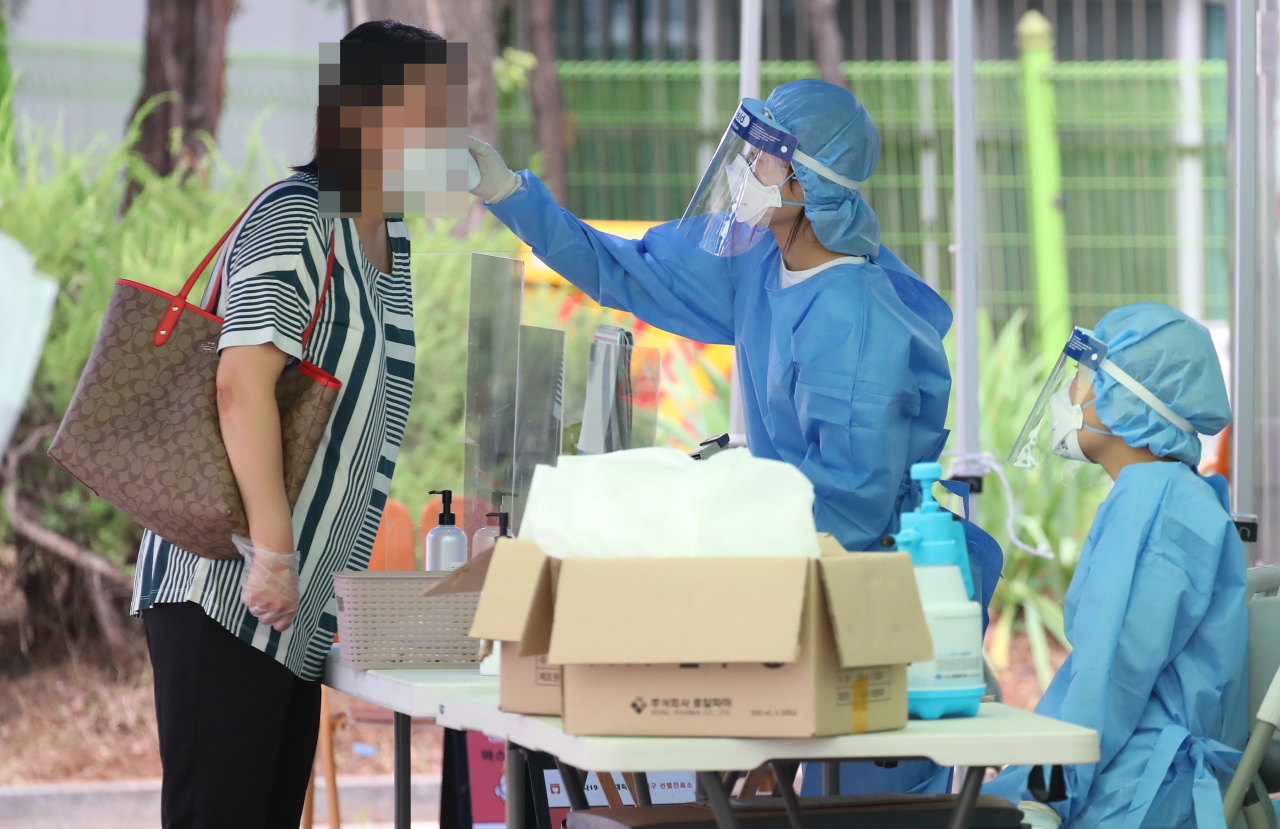New virus cases dip below 30, imported cases still in focus
By YonhapPublished : July 27, 2020 - 10:25

South Korea's new coronavirus cases fell back to below 30 on Monday as imported cases dwindled from a record high over the weekend, but the country is still on guard against a steady rise in cases coming in from overseas.
The country added 25 new cases, including 16 cases from abroad, bringing the total to 14,175, according to the Korea Centers for Disease Control and Prevention (KCDC).
The tally marked a sharp fall from 58 new virus cases reported Sunday and a four-month high of 113 on Saturday.
The country's imported cases have recently surged as infections spiked among South Korean workers returning home from Iraq and Russian sailors. Imported cases have risen by double-digit daily figures for more than a month.
At least 120 South Korean workers returning from Iraq have been confirmed to have contracted the virus. Of some 290 people who returned home Friday, 76 workers have tested positive for the virus. South Korea brought home hundreds of nationals from virus-hit Iraq twice in July.
Since June, South Korea has also detected 78 virus cases from eight Russian ships docked here. At least 32 Russian sailors tested positive last week and nine related cases, including a Korean repairman, have been identified.
"It is time to apply stricter management in a bid to prevent imported cases from evolving into community spread," Yoon Tae-ho, a senior health official, said in a briefing.
The government said it will push for a legal revision to make foreign coronavirus patients cover the costs of their treatment here. Currently, South Korea treats locals and foreigners for COVID-19 free of charge.
"We plan to gradually implement ways to charge foreign patients by taking into account quarantine situations at home and abroad and the local medical system," Yoon said.
Of 696 patients identified over the two weeks, imported cases accounted for 63 percent, while cluster infections came in at 21 percent, the KCDC said.
Related to foreign cases, local police said they are tracing the whereabouts of three Vietnamese nationals who arrived in the country on July 20 and were placed in quarantine at a holding facility in Gimpo, just west of Seoul. Health authorities said the three who left the holding facility without permission have not tested positive for COVID-19. The facility is currently occupied by some 600 people who are in self-quarantine after arriving in the country.
Sporadic cluster infections in the Seoul metropolitan area and some cities have also harried the country's containment efforts.
Of the newly reported cases, nine were local infections, the KCDC said. Seoul reported six cases, followed by two in Gyeonggi Province that surrounds the capital and one in the southeastern city of Busan.
Cases tied to a nursing home in western Seoul reached 28 as of noon, up three cases from the previous day.
Infections traced to an office in Seoul's southwestern ward of Gwanak added one case to 38.
"The number of locally transmitted cases slightly declined, but cluster infections continued to spring up sporadically mainly in the greater Seoul area," KCDC Director Jeong Eun-kyeong said in a briefing.
The country shut down a section of the government complex in central Seoul over the weekend, as a public servant was confirmed to be infected with the virus Friday. The KCDC conducted virus tests on 57 people who came in contact with the patient, all of whom tested negative for the virus.
Jeong said the country is facing three major risk factors: no letups in global virus outbreaks, summer vacations and infection vulnerability for senior citizens.
The country's health authorities remain jittery over another wave of virus outbreaks in summer amid sustained rises in local infections and cases coming in from overseas, she said.
The KCDC said a defector suspected to have fled to North Korea appears not to have contracted the new coronavirus.
North Korea's media claimed Sunday a defector returned home from South Korea with virus symptoms, prompting the country to adopt a "maximum emergency system" against the coronavirus.
"The person is neither registered as a COVID-19 patient nor classified as a person who came in contact with virus patients," Yoon said.
He added that the KCDC conducted virus tests on two people who had close contact with the defector, and both of them tested negative for the virus.
South Korea's military said the defector is believed to have swum across the border from the western border island of Gwanghwa after going through a drain under barbed wire fences to evade South Korean border guards.
South Korea gave the go-ahead to all church gatherings on Friday. Over the previous two weeks, meetings other than regular worship services had been banned amid an increase in church-tied cluster infections.
Spectators were also allowed to attend sports events over the weekend on a limited basis, starting with baseball games.
The country reported one additional fatality, raising the death toll to 299, according to the KDCD. The fatality rate reached 2.11 percent. Health authorities said one more person, in his late 70s, died during the day while undergoing treatment. The death, the 300th for the country, will be reflected in the official tally Tuesday.
The number of patients fully cured of the virus reached 12,905, up 15 from the previous day.
South Korea has carried out 1,526,974 tests since Jan. 3. (Yonhap)








![[KH Explains] Hyundai's full hybrid edge to pay off amid slow transition to pure EVs](http://res.heraldm.com/phpwas/restmb_idxmake.php?idx=644&simg=/content/image/2024/04/18/20240418050645_0.jpg&u=20240419100350)







![[From the Scene] Monks, Buddhists hail return of remains of Buddhas](http://res.heraldm.com/phpwas/restmb_idxmake.php?idx=652&simg=/content/image/2024/04/19/20240419050617_0.jpg&u=20240419175937)

![[KH Explains] Hyundai's full hybrid edge to pay off amid slow transition to pure EVs](http://res.heraldm.com/phpwas/restmb_idxmake.php?idx=652&simg=/content/image/2024/04/18/20240418050645_0.jpg&u=20240419100350)

![[Today’s K-pop] Illit drops debut single remix](http://res.heraldm.com/phpwas/restmb_idxmake.php?idx=642&simg=/content/image/2024/04/19/20240419050612_0.jpg&u=)